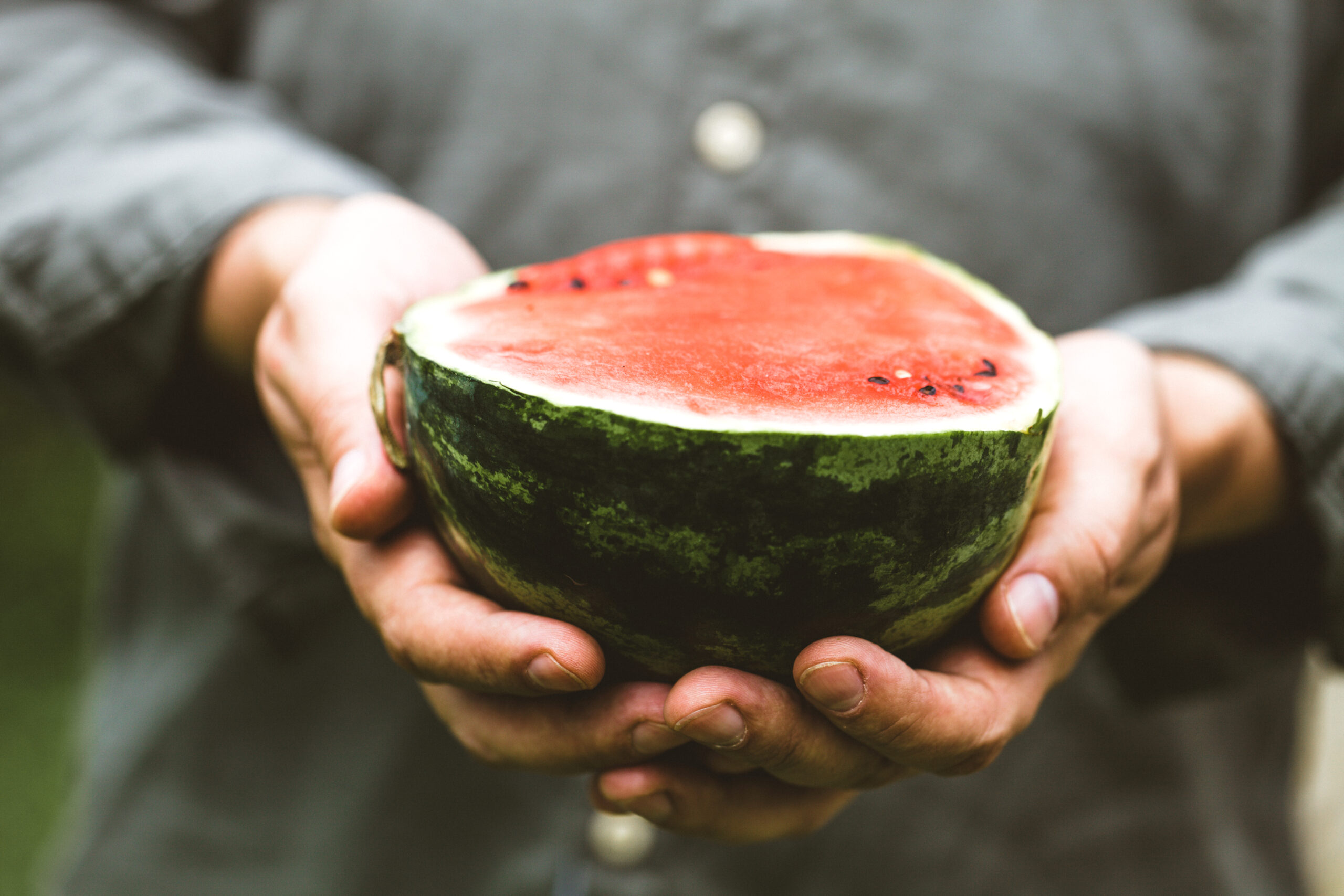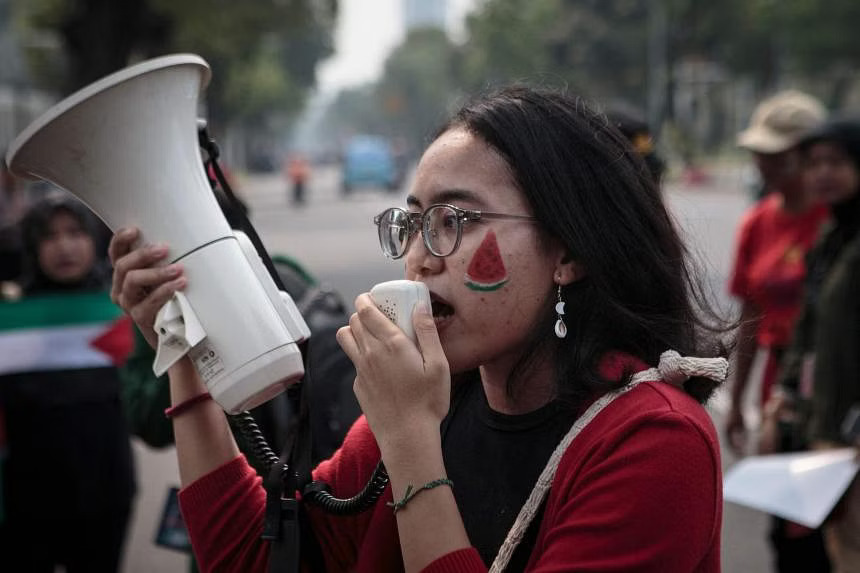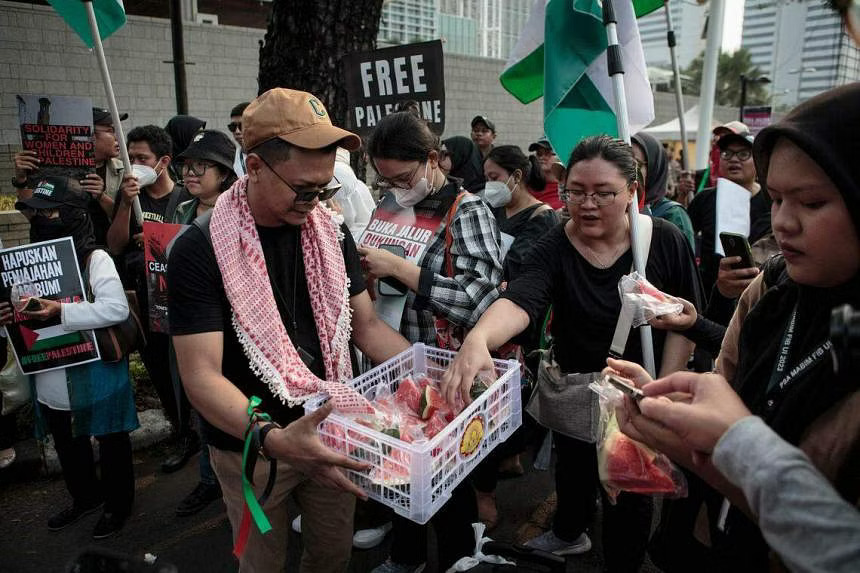JAKARTA (ANN/THE STRAITS TIMES) – A surge of watermelon emojis is flooding social media in Indonesia and Malaysia as a display of solidarity for Palestinians leading to at least one company disabling its comments section to manage messaging amid the ongoing Israel-Hamas war.
The sliced watermelon emoji, with its red flesh, black seeds, green outer shell, and white inner shell, mirrors the colours of the Palestinian flag as some users claim that direct Palestinian symbols face restrictions on US-based social media platforms like Instagram and X (formerly Twitter), prompting the use of the watermelon emoji.
KFC Indonesia has disabled the comments section of its Instagram account following harsh words and insults thrown at the American restaurant chain. The company has not issued a statement on the issue.
This is as it and other American restaurant chains and products are also facing boycotts in the two South-east Asian countries with Muslim majorities as anger rises over US support for Israel and its war on Gaza.
While the Palestinian flag emoji is widely used on social media postings as a show of support, others use the watermelon slice as their profile pictures or in postings about the Gaza war.
One X user Bang SiPoel posted the emoji and a report from a Western media outlet explaining why the watermelon emoji is being used, and shared photos of the ongoing Israel-Hamas war that is entering its second month.
Guruh Riyanto, 36, a resident of Bekasi, West Java province, a Catholic devotee who uses a picture of a sliced watermelon as his profile photo, told The Straits Times: “It is a sign of solidarity (with) the Palestinians in Gaza and a reminder that a lot of people are suffering there, because of an aggression, a war crime.”

A non-American company that got tangled in the flurry of boycott calls was Grab, the regional food deliveries, mobility and e-wallets giant.
This followed viral postings in social media showing Chloe Tong, the wife of company co-founder Anthony Tan, saying she was “heartbroken”, and that she had fallen “completely in love with Israel” after two recent visits.
Pictures and videos on TikTok and other social media platforms showed users uninstalling the superapp from their phones, and one Grab worker removing a Grab food bag from his motorcycle.
X platform user BagindO KOpi said: “Yes that is your business (to love Israel). My business is to uninstall Grab from my Android, that is all.”
The episode, while involving a personal comment by an individual not directly linked to the company, underscores the depth of feelings over the conflict, and compelled the company to issue a statement.
Grab last Friday referred to “a social media post that has been circulating”, saying it was “on the side of humanity and hopes for peace and a ceasefire”.
“We do not support any form of violence and as a participant of the United Nations Global Compact, we are aligned with its principles and respect the protection of human rights,” it said.
Meanwhile, sales at many branches of Starbucks and KFC in Indonesia, which has the world’s largest Muslim population, have recently slumped following boycott calls, as consumers became upset after reading on social media these companies’ alleged support for Israel.
Similar boycotts are happening in Malaysia involving many American fast-food franchises, after photos of Israeli troops posing with these brands’ fried chicken, burgers and coffee cups were posted online. There have also been news reports that some franchises have been giving free food to Israeli soldiers.

In Indonesia, among those affected is Rudy Syamsuddin, a Starbucks franchisee with an outlet in Makassar, South Sulawesi, who said daily sales had dropped to around IDR12 million (SGD1,000) since last Friday, from IDR25 million normally.
“We are feeling how powerful the effect of social media is on the community, on the real world,” Mr Rudy told The Straits Times by telephone on Wednesday.
Indonesian netizens voiced protests against Starbucks after the US company criticised its workers’ union for sharing a social media post that read “Solidarity with Palestine!” and argued the post reflected the union’s support for violence perpetrated by Hamas.
Indonesian consumers have also shunned McDonald’s and KFC outlets, accusing the restaurant chains of supporting the Israel Defence Forces. KFC was the first Western restaurant chain to enter Indonesia in 1978 and has been the most popular.
Starbucks Indonesia’s Instagram posts have been filled with netizens calling for a boycott of the brand, but some were against it.
“I used to love your green tea latte, but now I think it’s OK not to buy any more because I stand with the Palestinian people,” said Ira Hapsari, a Jakarta-based digital designer, in a post.

Another post by Indonesian resident Yongki Andreade a week ago says: “Can’t stand genocide.”
Consumers who own prepaid Starbucks’ cards have been asking to withdraw their funds. Instagram user Silvia Dewi Kamaludin posted last week: “How do we transfer, withdraw our balance on our Starbucks prepaid card? I have quite a lot on my balance.”
There were also voices of support, including that of account user rnkasbln, who said in his post four days ago: “Whatever happened we are still Starbucks lovers.”
Observers including Riza Widyarsa, who teaches international relations at a Jakarta-based university, said the boycott movement of the products made by companies deemed as supporters of Israel would likely last only several months.
I Made Anom Wiranata from a university in Bali agrees, pointing out that most of these restaurant chains’ outlets across Indonesian cities have continued to operate normally, stressing that only some have been affected.
Riza said the boycott movement is not effective because it is directed at the products of American companies, not Israeli.
He noted that Israeli products are used predominantly by the government rather than ordinary consumers, adding that these products, including military drones, are imported in small quantities. “Indonesia-Israel bilateral trade is very small,” he told The Straits Times.






